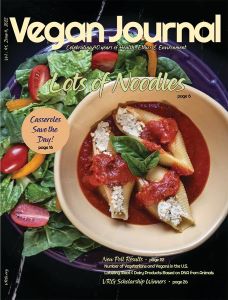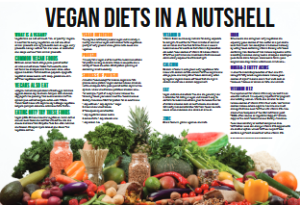GIVING TUESDAY
Giving Tuesday is November 29th this year. If you would like to support The Vegetarian Resource Group’s outreach and research, you can donate at www.vrg.org/donate. Thank you.
Giving Tuesday is November 29th this year. If you would like to support The Vegetarian Resource Group’s outreach and research, you can donate at www.vrg.org/donate. Thank you.
The Vegetarian Resource Group has a graphic called Burrito on My Plate, which shows viewers the water footprint of a vegan versus a meat-based burrito. It takes 225 gallons of water to make a vegan burrito without tofu and 253 gallons of water to make a vegan burrito with tofu. In comparison, it takes 541 gallons of water to make a beef burrito.
The Burrito on My Plate Graphic can be seen here: https://www.vrg.org/environment/BurritoOnMyPlate.pdf
The article detailing how we came up with the numbers of gallons of water needed to produce each type of burrito can be found here: https://www.vrg.org/journal/vj2017issue2/2017_issue2_burrito_plate.php
Nothing beats adding a condiment to a vegan burger, sandwich, samosa, salad, etc. Chef Nancy Berkoff provides recipes for making vegan condiments in your own home. You can prepare Agave Mustard, Last Minute Ketchup, Mint Chutney, Harissa, Vegan Mayonnaise, BBQ Sauce, and Caponata.
Read the entire article here: https://www.vrg.org/journal/vj2017issue1/2017_issue1_vegan_condiments.php
Subscribe to Vegan Journal in the USA only by visiting https://www.vrg.org/member/2013sv.php
 Giving Tuesday is November 29th this year. If you would like to support The Vegetarian Resource Group’s outreach and research, you can donate at www.vrg.org/donate. Thank you.
Giving Tuesday is November 29th this year. If you would like to support The Vegetarian Resource Group’s outreach and research, you can donate at www.vrg.org/donate. Thank you.
 The Vegetarian Resource Group is celebrating its 40th Anniversary this year and we have changed the name of our quarterly magazine to Vegan Journal. You’ll find the same type of articles and recipe pieces in an updated format. Enjoy in-depth original research, product and book reviews, scientific updates on veggie nutrition, delicious vegan recipes with gorgeous photos, plus so much more. Both long-term vegans and those new to a vegan life-style will enjoy this magazine.
The Vegetarian Resource Group is celebrating its 40th Anniversary this year and we have changed the name of our quarterly magazine to Vegan Journal. You’ll find the same type of articles and recipe pieces in an updated format. Enjoy in-depth original research, product and book reviews, scientific updates on veggie nutrition, delicious vegan recipes with gorgeous photos, plus so much more. Both long-term vegans and those new to a vegan life-style will enjoy this magazine.
To subscribe in the USA, see: https://www.vrg.org/member/2013sv.php
Perhaps you’ve heard about Aquafaba. The liquid you’ve been draining from your beans all these years is actually surprisingly similar to raw egg whites and can be used for baking in much the same way. The liquid can be baked, whipped to make meringue, turned into marshmallows, or used to create uncanny cheese substitutes.
Laura McGuiness shares her experience baking with aquafaba in a past issue of Vegetarian Journal. She explains, “Aquafaba is still largely a mystery, even to scientists. The proteins and starches in the bean juice appear to mimic the proteins in egg whites, but the exact science leaves something to be desired. What we do know from an analysis by The Norwegian Food Research Institute is that aquafaba is mainly composed of starch and proteins. Because of the high starch content, aquafaba is able to form stable gels, which may aid in its ability to emulate egg whites.”
You’ll find the following recipes in this article along with photos of some of the baked items:
Basic Meringue Cookies
Baked Alaska
Lemon Apocalypse Pie
Chocolate Mousse
Walnut Fudge
Lemon Dacquoise
The article can be found here: Aquafabulous
To subscribe to Vegan Journal, visit: http://www.vrg.org/member/2013sv.php
 Share this handy poster with family and friends. You can also print it out and post it on your refrigerator. See: https://www.vrg.org/nutshell/VeganDietsinaNutshellPoster.pdf
Share this handy poster with family and friends. You can also print it out and post it on your refrigerator. See: https://www.vrg.org/nutshell/VeganDietsinaNutshellPoster.pdf
Most ballet and dance shoes are made with animal products; however, you can purchase vegan alternatives. Cynthia King Dance Studio offers the CKDS ballet slipper with canvas uppers and synthetic leather soles in adult and children’s sizes and various colors. Call (718) 437-0101 or visit www.cynthiakingdance.com. Very Fine Shoes offers a wide variety of custom made vegan dance shoes. Visit www.veryfineshoes.com/veganshoes
 Thank you to more generous donors, in 2023 The Vegetarian Resource Group will be awarding $30,000 in college scholarships! Deadline is FEBRUARY 20, 2023.
Thank you to more generous donors, in 2023 The Vegetarian Resource Group will be awarding $30,000 in college scholarships! Deadline is FEBRUARY 20, 2023.
We will accept applications postmarked on or before FEBRUARY 20, 2023. Early submission is encouraged.
Applicants will be judged on having shown compassion, courage, and a strong commitment to promoting a peaceful world through a vegetarian (vegan) diet/lifestyle. Payment will be made to the student’s college (U.S. based only). Winners of the scholarships give permission to release their names to the media. Applications and essays become property of The Vegetarian Resource Group. We may ask finalists for more information. Scholarship winners are contacted by e-mail or telephone. Please look at your e-mail.
If you would like to donate to additional scholarships or internships, go to www.vrg.org/donate
Applications: Please click here to download a PDF of the application. However, applicants are not required to use an application form. A neatly typed document containing the information below will also be accepted as a valid application.
Please send application and attachments to [email protected] (Scholarship application and your name in subject line) or mail to The Vegetarian Resource Group, P.O. Box 1463, Baltimore, MD 21203.
If emailing, please put your essay in a separate attachment with your first name and last initial. A PDF or Word document is preferred, but if you send a Google document, make sure permission is given so readers can access it. For more information call (410) 366-8343 or email [email protected].
Do people eating vegan diets have diets that are closer to recommendations? Do they eat more vegetables or less saturated fat than nonvegetarians? There are only a few studies that have investigated this on a large scale. One has been going on for about 30 years in the United Kingdom.
EPIC-Oxford, the Oxford cohort of the European Prospective Investigation into Cancer and Nutrition, is a large observational study that includes 65,000 adult men and women living throughout the U.K. Approximately 30% of subjects are lacto-ovo vegetarian and 4% are vegan (1).
During the study period, EPIC-Oxford subjects answered questions about their health and food choices. These answers provided insights into what a vegan diet looks like in the U.K. Overall, vegans, along with lacto-ovo vegetarians, had much higher intakes of soy foods, dried beans and lentils, and nuts compared to nonvegetarians. They also had higher intakes of whole grains, fruits, and vegetables. This is not surprising since we’d expect that vegans and lacto-ovo vegetarians would choose soy foods, dried beans and lentils, and nuts to replace animal-based foods.
Vegans had much lower saturated fat intakes than nonvegetarians in this study. There was not as much difference in saturated fat intake in lacto-ovo vegetarians compared to nonvegetarians. The higher saturated fat intakes of lacto-ovo vegetarians compared to vegans is probably due to generous use of cheese. The lacto-ovo vegetarians ate about 50% more cheese than the nonvegetarians did; cheese is often high in saturated fat. Vegans appeared to have lower protein intakes than nonvegetarians but these results are questionable because the dietary questionnaires used may not have included some newer protein-rich foods that vegans might have used.
Average dietary calcium intakes of vegans were lower than those of other study participants. Vegan calcium intakes increased over the course of the study, possibly due to greater availablity of calcium-fortified foods but still were lower than those of nonvegetarians and lacto-ovo vegetarians.
It was challenging to assess vitamin B12 intake since food fortification and supplement composition is quite variable. The researchers did look at vitamin B12 status of a subset of men and found that many vegans had blood levels of vitamin B12 that would indicate a vitamin B12 deficiency. This research was done close to 25 years ago. Changes to food fortification practices and increased awareness by vegans of vitamin B12 sources suggest that an updated assessment of vitamin B12 status is needed.
For most nutrients, the intakes of vegans were nutritionally adequate and met or were close to meeting government guidelines for good health. It would be interesting to conduct a similar study in the United States, using many more vegans.
Reference
To read more about EPIC-Oxford see:
Long-term Studies of Vegetarians
Adequate Calcium Important for Vegan Bone Health

Join The VRG with $35 via our subscription form, and receive the Vegan Journal for two years and a copy of Simply Vegan!
The Vegetarian Resource Group (VRG) is a non-profit organization dedicated to educating the public on veganism and the interrelated issues of health, nutrition, ecology, ethics, and world hunger. We have been helping health professionals, food services, businesses, educators, students, vegans, and vegetarians since 1982. In addition to publishing the Vegan Journal, VRG produces and sells a number of books.
Sign up for our newsletter to receive recipes, ingredient information, reviews of new products, announcements of new books, free samples of products, and other VRG materials.